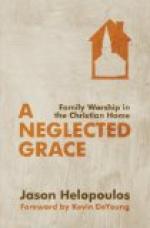Childhood is the period in which the principles of Christianity can be the most effectually engrafted in our nature. Its pliability at that period insures its free assimilation to the spirit and truth of religion. “Would to God,” says St. Pierre, “I had preserved the sentiment of the existence of the Supreme Being, and of His principal attributes, as pure as I had it in my earliest years!” It is the heart more than the head that religion demands; and you can fill the young heart with sentiments of God better than if you wait till it grows hard as adamant in sin. You can elevate the soul of your child to God, and teach it to raise its little hands and voice in prayer to the Most High. You can teach it this from the book of nature and of revelation,—from the daisies that spring up among the grass upon which it frolics, by the mellow fruits after which it longs, by the stars that shine in unclouded luster above it, and by the breezes which ruffle its silken curls, and bring perfume to its smiling face.
To the mother especially, is committed the religious education of the child at home. She is eminently adapted, if herself a Christian, for such a work. Her love, her piety, which breathes in every word, in every look, makes her instructions effectual and pleasing.
“’Tis pleasing to be schooled
by female lips and eyes,
They smile so when one’s right,
and when one’s wrong,
They smile still more; and then there
Comes encouragement in the soft hand
Over the brow, perhaps even a chaste kiss—
I learned the little that I know by this.”
They can better reach and train the heart. Religion is heart-wisdom. “My son, give me thy heart!” We may use the head as an avenue to the heart, yet nothing is done in the religion of our children until the heart be carried. It is only in that inner shrine that there can be deposited the wisdom that is from above, and only then will they be made wise unto salvation. And who is better able to storm and carry that inner citadel, and lead its subdued inmates to the Cross, than the pious, tender-hearted, soliciting mother!
Some parents object to the religious training of their children, “because,” say they, “there is danger of having their minds biased by some particular creed; they should be left, therefore, to themselves till they are capable of making a choice, and then let them choose their creed.” This is all a miserable subterfuge, and in direct opposition to the explicit command of God and the whole tenor of the gospel plan of salvation. It goes upon the assumption that religion is but an opinion—a subscription to a certain creed, learning certain doctrines—a mere thing for the head. Tell me, is it worse to bias their minds to a particular creed, than to let them grow up biased to the world, to the Devil and all his works? Is it all of home, religious culture to bias them to a particular creed? Besides, is it not the right, yea, the duty of parents to bias their children in favor of the religious creed of the parental home? It shows, therefore, that those parents who, for this reason, object to religious training, have but little love for, and confidence in, their own creed, or they would not shrink from biasing their children to it.




